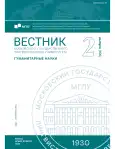Speaker’s Empathy as a Linguistic Problem (using the example of French media discourse)
- 作者: Tunitskaya E.L.1
-
隶属关系:
- Russian foreign trade academy (Ministry of Economic Development of the Russian Federation)
- 期: 编号 2(896) (2025)
- 页面: 103-110
- 栏目: Linguistics
- URL: https://bakhtiniada.ru/2542-2197/article/view/284010
- ID: 284010
如何引用文章
全文:
详细
The article analyzes the use of the term “speaker’s empathy” in modern Russian and foreign linguistics. The analysis aims to clarify the very understanding of this term, to prove its scientific relevance for a pragmatic description and to show the mechanism of the speaker’s empathy in French discourse, that is, to identify its linguistic markers. The study was carried out on the material of a media discourse: a number of French Internet messages about one event (the assassination attempt on Donald Trump). The analysis is based on the method of structural and semantic comparison of the propositions prevailing in the studied material. This made it possible not only to clarify the understanding of this term in linguistics, but also to identify the linguistic markers of the analyzed phenomenon in French media discourse, as well as to show the role of a broad context in its implementation.
作者简介
Elena Tunitskaya
Russian foreign trade academy (Ministry of Economic Development of the Russian Federation)
编辑信件的主要联系方式.
Email: e-tunia@yandex.ru
Doctor of Philology, Associate Professor, Professor at the Department of Roman-Germanic languages
俄罗斯联邦参考
- Chafe, W. (1982). Dannoe, kontrastivnost`, opredelennost`, podlezhashhee, topiki i tochka zreniya = Datum, contrastivity, definiteness, subject, topics and point of view. In Novoe v zarubezhnoj lingvistike (vol. 11, pp. 277–317). Moscow: Nauka. (In Russ.)
- Lyons, J. (1977). Semantics. London: Cambridge University Press.
- Kuno, S. (1976). Subject, Theme and the Speaker’s Empathy. Subject and Topic. New-York: Academic Press.
- Kuznetzova, L. A. (2010). Illokutivny`e tipy` verbal`noj e`mpatii = Illocutionary types of verbal empathy: abstract of Doctorate in Philology. Ufa. (In Russ.)
- Kovalenko, N. N. (2016). The Factor of Empathy in a Textual Fragment. Gumanitarnye nauchnye issledovanija, 4, 1. (In Russ.)
- Sheveleva, M. S. (2021). Teoriya e`mpatii v analize diskursa (na materiale anglijskogo i franczuzskogo yazy`kov). Filologicheskie nauki. Voprosy` teorii i praktiki = The theory of empathy in the analysis of discourse (based on the material of the English and French languages). Philological Sciences. Questions of theory and practice, 14(2), 543–552. (In Russ.)
- Pottier, B. (1992). Théorie et analyse en linguistique. Paris: Hachette.
- Rabatel, A. (2014). Empathie, points de vue, méta-représentation et dimension cognitive du dialogisme. Études de linguistique appliquée, 1(173), 27–45.
- Forest, R. (2003). Empathie linguistique et point de vue. Рraxematique, 41, 85–104.
- Los', A. L. (2014). Means for expressing empathy in the language. In Philology. Theory & Practice (vol. 10(40), p. 1, pp. 131–135): in 3 parts. (In Russ.)
补充文件










